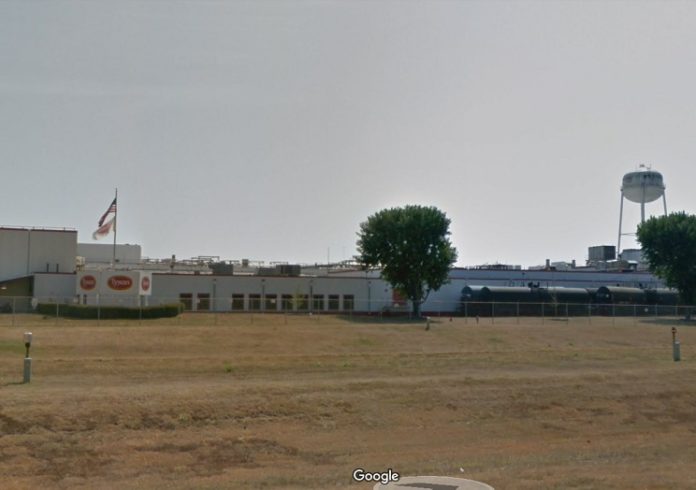
DES MOINES, Iowa — Two workers died Wednesday from the Tyson Foods pork plant in Columbus Junction, where nearly 200 of the factory’s 1,400 workers tested positive for COVID-19 as of Tuesday.
Liz Croston, communications manager for Tyson Foods Inc., confirmed the deaths to the Des Moines Register. The plant was closed April 6 after some 25 positive cases were identified.
Speaking at her daily press conference Wednesday morning, Iowa Gov. Kim Reynolds said 900 additional COVID-19 testing kits would be sent to the Louisa County Tyson plant Wednesday in addition to 200 sent last week.
Iowa Department of Public Health Deputy Director Sarah Reisetter said the 900 test kits would be used to conduct “surveillance testing,” a method of random testing of Tyson team members to see whether there are asymptomatic positive cases in the population.
An individual infected by the novel coronavirus can go up to 14 days before showing symptoms of COVID-19 and can infect many others during the asymptomatic period.
“We’re going to surveillance test and do tests on people who might not be showing symptoms and might not otherwise be ill,” Reisetter said. “The reason that we haven’t done widespread surveillance testing in our state to date is because we just haven’t had the testing supplies available to do that.”
ThePerryNews.com asked Croston, the Tyson communications manager, whether surveillance tests would be given to workers at the Perry plant as a precaution.
“We can’t answer your question on availability of tests for food companies,” Croston told ThePerryNews.com Wednesday in an email. “Maybe check with the governor’s office as the health department owns the testing.”
The spread of COVID-19 in packing plants is threatening the U.S. meat supply. At the Smithfield Foods Inc. plant in Sioux Falls, South Dakota, 80 new cases were confirmed Wednesday by the South Dakota Department of Health, bringing to 644 the number of cases connected to the plant, which was closed April 12.
Smithfield Foods said Wednesday it would close two more pork-processing plants — one in Wisconsin and one in Missouri — as a result of the coronavirus pandemic, which will further reduce meat supplies for grocery stores and risk causing a bottleneck for hog producers.
Reynolds said Iowa’s 18 packing plants are essential to the state’s critical infrastructure, and the owners of the plants are expected to follow the IDPH guidance and notify the department when 10% of their workforce is ill, the same guidance given to school districts during flu season.
“This is about feeding not only Iowans but the world,” Reynolds said Wednesday, “and so they know that they have a responsibility to take care of their employees.”
U.S. President Donald Trump also spoke Wednesday to the outbreaks of the virus in the meat industry, including the closure April 10 of the JBS pork plant in Greeley, Colorado, where at least 277 JBS employees or dependents have tested positive for COVID-19.
According to the official White House transcript, a reporter said to the president, “I wanted to ask you specifically about one industry in particular, and that’s food-processing plants. Is there a priority to get testing at food-processing plants all across the country?”
President Trump replied, “Well, you’re asking that because of what happened — it’s a fair question, too — what happened in Denver. Because in Denver, I’ve never seen — I said, ‘What’s going on?’ We’re looking at this graph where everything’s looking beautiful and it’s coming down and then you got this one spike. It’s — I said, ‘What happened to Denver?’
And many people, very quickly, and they — by the way, they were on it like, so fast, you wouldn’t believe it. They knew every aspect. They had people go and — not only testing, ‘Who did you see? Where were you? How many people did you meet? Were you out to dinner in somebody else’s home? Where were you?’ Where did — where did this number of people come from? How did — they are totally on it. Now, this just happened. I just saw it this morning. I’m looking at everything smooth, going down, topping out. And then you have this one spike in Denver. It’s like, where did this come from? So we’ll be looking at that. And we don’t want cases like that happening. This was — but this — this is the kind of thing can happen. This is very complex. This is a very brilliant enemy. You know, it’s a brilliant enemy. They develop drugs like the antibiotics. You see it. Antibiotics used to solve every problem. Now one of the biggest problems the world has is the germ has gotten so brilliant that the antibiotic can’t keep up with it. And they’re constantly trying to come up with a new — people go to a hospital and they catch — they go for a heart operation — that’s no problem, but they end up dying from — from problems. You know the problems I’m talking about. There’s a whole genius to it. We’re fighting — not only is it hidden, but it’s very smart. Okay? It’s invisible and it’s hidden, but it’s — it’s very smart. And you see that in a case like a Denver. But, you know, I think we’re doing well, and they’re on Denver like you wouldn’t believe. I came in this morning; it was a flurry. I said what’s going on? They said, ‘Denver.’ I said, ‘What happened to Denver?’ Because Denver was doing pretty well. And they’ve got that under control. But, yeah, that would be a case where you do some very big testing.”















